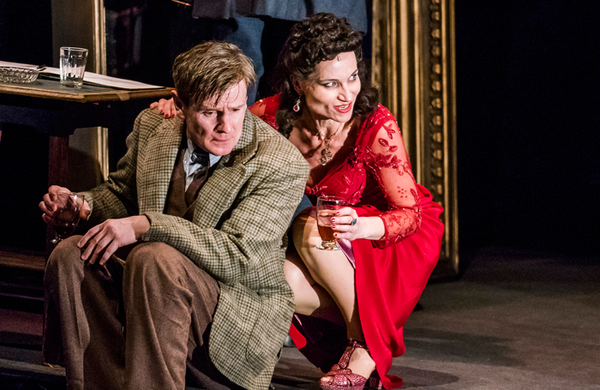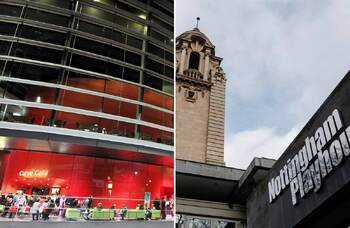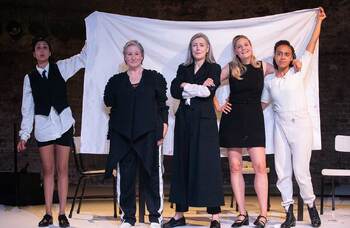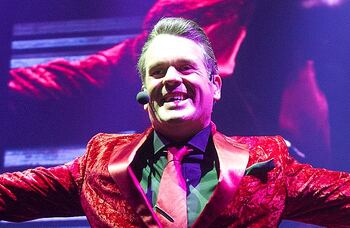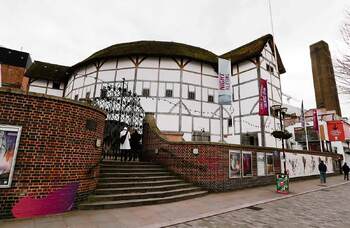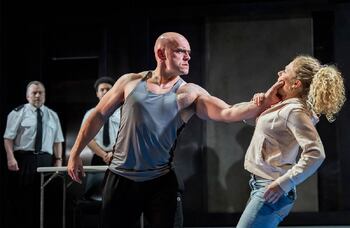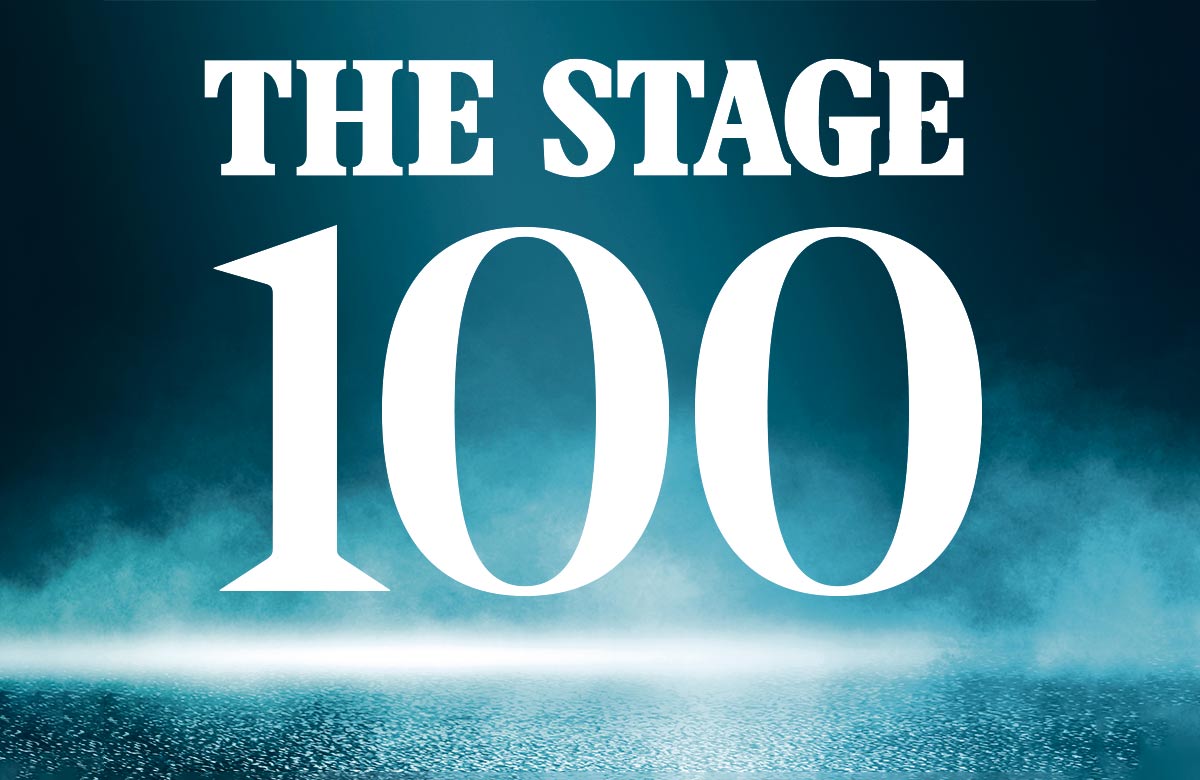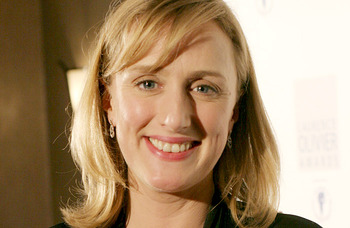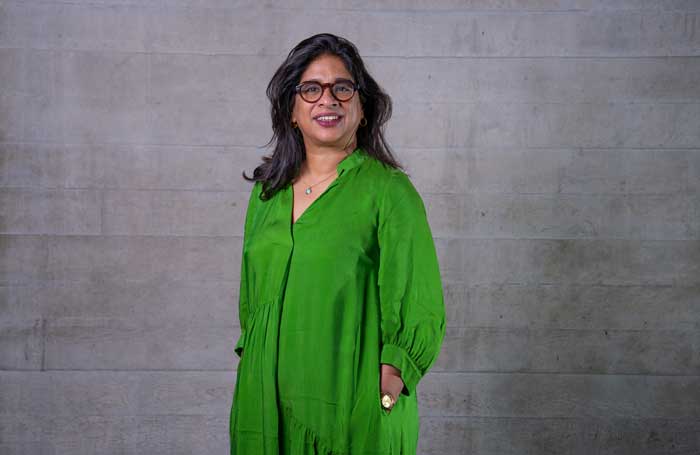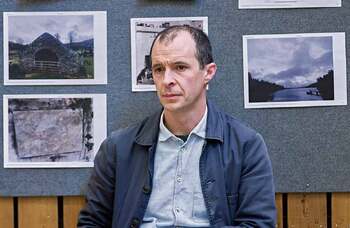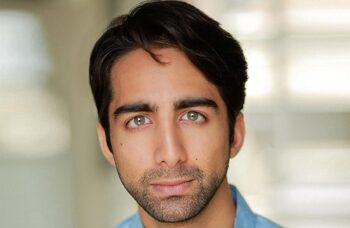Kate Fleetwood: 'The more versatile you are, the better chance of longevity'
The chameleon actor made her mark with a string of lauded lead performances including Lady Macbeth and Medea. Ahead of starring in Absolute Hell at the National she tells Sam Marlowe how preparing for opening night is like having a baby, wanting to ‘have a crack at’ Richard III and about working with artistic director husband Rupert Goold
Kate Fleetwood is yelling out of the window. “Bloody actors. Shut up!” She slams the casement shut, muffling the sounds of thesps letting off steam in the courtyard overlooked by the National Theatre’s dressing rooms. But this is only mock rage. Actors are her tribe, and she couldn’t be more at home than in the midst of all the hubbub. “I just love being part of a company, coming together with brilliant people to make something together,” she says, a wide grin spreading across her face. “It’s the reason I come to work.”
And she works a lot. Our conversation is over a snatched lunchbreak on tech day for Absolute Hell, Rodney Ackland’s pungent, emotionally intense drama set in a Soho nightclub at the end of the Second World War.
Absolute Hell review at National Theatre, London – ‘superbly acted portrait of wartime Soho’
During rehearsals, she has also been filming the second season of Harlots – Moira Buffini’s gripping, witty television period drama, in which Fleetwood is a swashbuckling, cross-dressing dominatrix.
Cross-legged on her dressing-room bed, her eyes dramatically accentuated by heavy kohl and with gauze poking out of her curled black wig, she radiates a kind of contained energy. So far, she says, the day has been “gruelling, but exciting” and her attitude to the job is eminently practical.
Fleetwood is playing Christine, the desolate, alcoholic, self-deluding landlady. It is a leading role that requires her to be on stage for most of what started as almost four demanding hours, though by press night that had reduced closer to three.
Positive collaboration
She didn’t know Ackland’s play, but when she read it, “I couldn’t resist Christine”. The character brought to mind an old family photo of her grandmother Mary, who was a barmaid in Bootle in the 1950s. When Fleetwood is wigged and made up, she says, the resemblance is uncanny.
The drama, too, was a juicy prospect. Originally produced in 1952 and titled The Pink Room, its depictions of debauchery, drunkenness and homosexuality saw it branded “a libel on the British people” and eviscerated by the censors. It was revised and renamed in 1988 by Ackland for the Orange Tree, and it is this version that is now being presented on the National Theatre’s Lyttelton stage.
It’s a play about loneliness, pride, drink, loss, and the savagery of war. With the world falling apart today, it’s very vivid
“It’s a play about loneliness, pride, drink, loss, all those human things,” Fleetwood says. “And the savagery of war, and the fact that even when you ‘win’ – everyone’s still picking over the rubble. And with the world falling apart today, it’s very vivid.”
She can see the parallels with today’s febrile political climate. “Christine would have been a real Brexiteer,” she says. “She wants any immigrants to fuck off back to Germany or wherever they came from, apart from the Americans – she likes the GIs. So she doesn’t want the war to end because then they would have to go home.
“She’s very scared of the future. She wants to live in a bit of a time warp, and before she knows it the whole thing’s fallen down around her ankles. It’s so modern, and anyone who comes along thinking they’re going to be seeing a Rattigan-esque period piece is going to be really shocked by the tone of the language and the themes in it.” Director Joe Hill-Gibbins has previously staged Measure for Measure with blow-up sex dolls and put a jelly fight into The Changeling and Fleetwood promises there are “some surprises” in this production.
“The costumes and set are extraordinary, and it’s incredibly visual. I mean, nothing’s flying out of the sky or anything, but the tone is very Hill-Gibbinsian; things are very stretched and warped. And it’s populated, there are 30 of us on stage, and it’s very physical. I’ll leave it at that.”
At 45 years old, Fleetwood has played some terrifically meaty, challenging roles, among them Medea and Lady Macbeth – “lucky me” – both in productions directed by her husband Rupert Goold, acclaimed theatre director and artistic director of the Almeida theatre, with whom she has two children.
The actor has long wanted to work with Hill-Gibbins. “He’s so creative,” she says. “He reminds me a bit of Rupert actually.”
She admits that her work makes significant demands on body, mind and heart. “We’re all just showing versions of ourselves really, and sometimes that can become a bit pornographic – drawing on so many parts of yourself, and expressing them to a paying audience,” she says. “That’s when it can start to feel a bit ‘urgh’, and you’ve got to… ” She breaks off, and winces “… stop. You’ve got to stop.”
She’s not in the least worried about losing her sanity, however dark the role. “How does someone preserve their sanity when they’re a surgeon, or working in a hospice?” she asks. “I’m pretty low-key about the effect upon my psyche as an actor, because I just feel fully aware that I have a really privileged life, and I’m doing the thing that I really love doing.
“I’m not a method actor, I don’t take it home with me. There are just too many other things asking for my attention. And also, I like to collaborate, and if you’re too focused on yourself, you’re missing what other people in the company are doing, what they’re contributing and their journey. So I try not to be too introspective. I can be introspective on the train on the way home. Before I’m asked to make dinner for everybody.”
Perhaps Fleetwood’s pragmatism, as well as her technique, stem partly from the fact that she was an early starter: her first professional job was for the Royal Shakespeare Company at the age of 12. Her family are from Liverpool. “We’re all Scousers,” she says lapsing into a Mersey accent, “so there’s a sort of performative element to everything.”

Her father was a farm manager, her mother a nurse and her elder sister, Marion, is a musician. Kate was born in Cirencester in 1972, and soon after the Fleetwoods moved to Stratford-upon-Avon. There she had her first experience of theatre, standing at the back with her dad and sister to watch Paola Dionisotti and Jonathan Pryce in The Taming of The Shrew. “I got the bug, and did loads of school plays,” she says, and then her mum spotted an ad in the Stratford Herald. The RSC was holding auditions to find community actors for a project at the Other Place: a double bill of promenade dramas about local working people during the First World War. The Dillen and Mary: After the Queen. In a state of high excitement, Fleetwood auditioned, and bagged the role of little Mary, with Peggy Mount playing her older counterpart.
It was a pretty auspicious debut. Barry Kyle directed and his assistant was Roger Michell, who is now a good friend, while Ron Cook played her dad. Fleetwood went on to play Mustardseed in Bill Alexander’s production of A Midsummer Night’s Dream the following season, which brought her into contact with actors including Tom Mannion, Pete Postlethwaite, Jane Horrocks, Niamh Cusack, Janet McTeer and Joely Richardson. “And that was it,” she says. “I knew what I wanted to do with my life. No question.”
Reasons not to be too famous
She took up a place reading drama at Exeter University, but found to her disappointment that there was no vocational element. “So I thought when I finished there I might just do two years at Webber Douglas or something, but I didn’t have any money. I was filling out my application forms for drama school, thinking, I can’t even afford to get to London, let alone pay the audition fee.”
Fortunately, John Retallack of Oxford Stage Company – coincidentally, the company that her husband would later reinvent and revitalise as Headlong – had seen a first-year production at the university, and Fleetwood stood out; just as she was in the throes of her finals, he offered her a job. It was a commedia dell’arte piece that capitalised on her love of physical performance, followed by a staging of Twelfth Night. Her portrayal of Viola brought her an agent, and her career began to take off.
She met Goold at an audition for Romeo and Juliet, which he directed at Greenwich Theatre before taking it on tour. He’d seen her in the OSC’s Mistero Buffo, by Dario Fo, but they had never actually met. He cast her as Juliet, and, as she puts it: “We worked together, and then we got together.”

They were just 24, “so, we’ve been together 20 years. Crazy.” Their professional relationship works, Fleetwood insists, because there’s nothing complicated about working together. “He’s just brilliant,” she shrugs. “He’s such a brilliant director. Clever, funny, and he knows how to make a company – that’s really important, the chemistry.
“Rupert always puts a bunch of really nice people together. There’s always laughter. He’s quite serious, but he’s also got a big sense of humour. And he just likes being surrounded by great people, he’s a collaborator. And that’s attractive, to see someone who’s really good at what they do.”
Read our 2016 interview with Rupert Goold
Does she ever disagree with his choices, and feel like saying so? “No, I don’t, genuinely,” she says. “I mean, he’ll ask my opinion, but we’re never at loggerheads about anything. He knows my taste, and I know his. We just know each other so well; you know, 20 years, two kids. But we do like talking about work, we talk about it all the time.”
At the start, Fleetwood says, “we had nothing. We really didn’t know where we were going to go, or how it would work out. But we had a lot of faith in each other. There were times when we were going to go bankrupt, and we thought we’d have to give up – it hasn’t always been good. I mean it’s always been exciting, but in the first 10, 12 years, when you’re skint and you’re working hundreds of other jobs, and he’s teaching…”
She changes tack: “So I was sitting on the stage in tech today thinking: ‘I can’t believe I’m doing this.’ When you’re 24, you never think you’re going to be playing a lead at the National. I always say to young actors: ‘Just keep going, and try everything.’ The more versatile you can be, the more chance you have of longevity. You always want to keep something up your sleeve. That’s a good reason not to be too famous.”

There’s certainly nothing of the fame-hungry diva about Fleetwood. She says she’s “rubbish” at networking and, when walking one glamorous red carpet, demonstrated her glorious down-to-earth approach – when asked for her must-have beauty product, she gave the refreshing response: “Sudocrem.”
As Absolute Hell’s opening night approaches, Fleetwood says she just doesn’t think about the pressure of an audience seeing it for the first time. “I try to ward off the notion of when it is. I just prefer to turn up, try to remember what I did yesterday, try to get better at what I did, and then at some point someone will say: ‘Right, there’s some people watching. Now do it.’
“It’s a bit like labour, like having a baby: there’s a due date, but it’s a sort of foggy area, somewhere over there,” she waves a hand into an unseen future. “It keeps me from getting too nervous, and it keeps me in work mode – keep your head down. Just keep working.”
While she never reaches a stage of thinking she has nailed a part, “you do get to a point where you know your race. Like a marathon runner or a sprinter. I inject the fuel here, this is where I take on water, this is where I need to breathe, this is where I’m heading emotionally, and I need to start dripping that stuff in by this point in the play, otherwise I’m not going to manage that pay-off.”
She adds: “But you don’t really know all that until you’ve done it a good few times. Sometimes you don’t really know it until the last show. It’s such a physical experience, being an actor. And on this play, I don’t know my race yet.”
Continues…
Q&A: Kate Fleetwood
What was your first non-theatre job?
Hay-baling.
What was your first professional theatre job?
Mary, After the Queen at the Royal Shakespeare Company as a child and Love Is a Drug with the Oxford Stage Company as an adult.
What do you wish someone had told you when you were starting out?
Read more plays while you’re unemployed.
Who or what was your biggest influence?
It’s always changing, but for this one, it’s my nan, Mary Culkin.
What’s your best advice for auditions?
Don’t talk too much, and don’t accidentally leave your bag in the audition room.
If you hadn’t been an actor, what would you have been?
Probably been a nurse, like my mum.
Do you have any theatrical superstitions or rituals?
No. I won’t pass on the stairs anywhere, but that’s not theatrical. I’ll happily say Macbeth and whistle in dressing rooms – Simon Russell Beale [who played the title role in the National Theatre’s King Lear, in which Fleetwood was Goneril] hates me for that!
Always pushing to somewhere new
Discussion of physicality and emotional vulnerability bring us to the MeToo question. “Obviously with everything that’s happened, everybody’s antennae have just shot up,” Fleetwood says. “A company of actors working together are more often than not going to be looking out for each other. And I’ve personally been very lucky, I’ve never had a bad experience.
“That’s not to say I haven’t experienced an attitude when I was a younger actress, from people in power who have put me in my place, put me down. I’ve had comments that made me roll my eyes. But it is a very serious issue in our business – in a rehearsal room making a show, you have to feel that you can trust people.”
At this point, her dresser Sam arrives with a crimson, hand-beaded dress, and Fleetwood whips off the jeans she’s wearing over Christine’s underwear – cami knickers, stockings and a bra down which she cheerfully stuffs her “chicken fillet” padding, or as she puts it “half a KFC family fun bucket”.

Fi, who does her hair, titivates the glossy wig while Fleetwood muses on future dream projects. “I haven’t done any Shakespeare for a while – obviously I want to play Cleopatra, but I’d also love to have a crack at Richard III,” she says. “I really want to do another musical, because that’s another kind of challenge.”
High Society, directed by Maria Friedman at the Old Vic, was a joy, and “it got me so fit – I will never look that good in jeans ever again”. Whatever’s next though, “it’s about going somewhere that’s not comfortable. When you walk through a door and a character’s so like you, it’s sometimes hard to see where the line is. So I always want to push, push, push to somewhere new.”
Wig and face fixed, Fleetwood stands up, smooths her skirt, and surveys herself in the mirror. “And there she is!” she says, her eyes meeting Christine’s. Time to get back to work.
CV: Kate Fleetwood
Born: Cirencester, 1972
Training: Exeter University
Landmark productions:
• Love Is the Drug, Oxford Stage Company (1995)
• Twelfth Night, Oxford Stage Company (1996)
• Romeo and Juliet, UK tour (1998)
• Ghosts, Theatre Royal Plymouth (1999)
• Love’s Labour’s Lost, National Theatre (2003)
• The Winter’s Tale, Royal Shakespeare Company (2006)
• Macbeth, Chichester Festival Theatre/Gielgud Theatre/Brooklyn Academy of Music/The Lyceum Theatre (2007-2008)
• Life Is a Dream, Donmar Warehouse (2009)
• London Road, National Theatre (2012)
• King Lear, National Theatre (2014)
• High Society, Old Vic (2015)
• Medea, Almeida Theatre (2015)
Agent: Sarah MacCormick and Emma Higginbottom at Curtis Brown
Absolute Hell is at the Lyttelton, National Theatre, London, until June 16
Opinion
More about this venue
Opinion
Most Read
Across The Stage this weekYour subscription helps ensure our journalism can continue
Invest in The Stage today with a subscription starting at just £7.99

